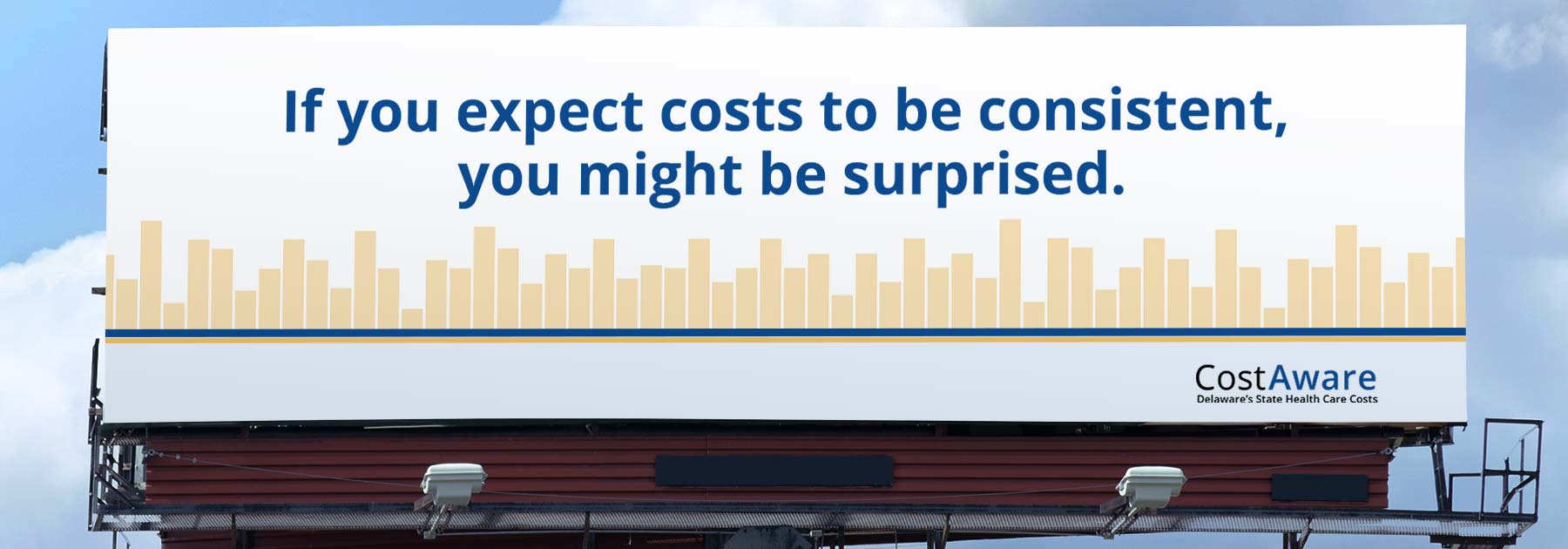Frequently Asked Questions
About the Website
- How do I use the CostAware website? A short video that explains how to use the website is available on both the Home and About pages.
- What is the purpose of this website? The CostAware website, developed by the Delaware Health Care Commission (DHCC), shows comparisons of health care activity, costs and outcomes for health care services, providers, and programs across Delaware. These findings are intended to inform collaborative initiatives and programs among health care providers to promote access to high-quality affordable care.
- How can the information be used? CostAware webpages were designed to increase awareness of variations in health care costs and quality in Delaware. CostAware reports provide information that allows consumers, employers, and other purchasers of health care to make more informed decisions about where to seek appropriate care.
- Who developed the website? The CostAware website was developed by the Delaware Health Care Commission (DHCC) and Department of Health and Social Services (DHSS).
- Are the costs for Delaware hospitals only? Currently, yes. DHCC, DHSS and Delaware Health Information Network (DHIN) are exploring options for providing similar information for hospitals located in neighboring states in future versions of CostAware.
- What is the 3M Episode grouper? 3M’s Patient-focused Episodes (PFE) Software is a tool that defines more than 300 episodes of care spanning ambulatory and inpatient settings, as well as persistent and unexpected diseases. Episodes are groups of related healthcare services that are provided to treat a condition or procedure within a specific time-period.
Frequently Used Terms
- What is the difference between DHIN, HCCD, and APCD? Delaware Health Information Network (DHIN) is the State-sanctioned Health Information Exchange (HIE) and manages the Health Care Claims Database (HCCD). The HCCD is Delaware’s name for what is also called an All-Payer Claims Database (APCD) in other states.
- What is an Accountable Care Organization (ACO)? ACOs are groups of doctors, hospitals, and other health care providers, who come together voluntarily to provide coordinated high-quality care to their patients. ACOs establish financial incentives for providers to promote best practice care to the right persons at the right time while improving patients’ overall health care experiences. The ACO initiative is a major piece in Delaware’s Road to Value – a plan to transform the way health care is delivered and paid for in the state. For more information on the Road to Value, visit: https://www.choosehealthde.com/Road-to-Value.
- What are CPT codes? Current Procedural Terminology (CPT) codes are developed and maintained by the American Medical Association (AMA). These codes are used to identify and categorize medical services performed by health care providers.
- What are APR-DRGs? All Patient Refined Diagnosis Related Groups (APR-DRGs) are used to categorize hospital inpatient procedures for patients receiving the same service and with similar clinical characteristics. APR-DRGs can be used to compare the cost of inpatient procedures across hospitals, health systems, states, and regions in a meaningful way and were assigned using the 3M All Patient Refined Diagnosis Related Groups software.
About the Methodology
- What is the data source? The Delaware Health Care Claims Database (HCCD), maintained by Delaware Health Information Network (DHIN). This database is a collection of claims data from Medicare, Medicaid and commercial health insurers and is the largest repository of claims data in the state. For more information about the HCCD, visit: https://dhin.org/healthcare-claims-database/.
- Why do prices differ across hospitals and providers? Many factors contribute to price variation, including differences in clinical practice, billing practices, contractual relationships between payers and providers, and payment systems used by health insurers.
- Why is data for Medicare and Medicare Advantage combined? CostAware combines data from traditional Medicare (fee-for-service or FFS) and Medicare Advantage plans to report results for more Medicare procedures and services than if reported separately.
- Traditional Medicare (or FFS) is a federal government program administered by the Centers for Medicare and Medicaid Services (CMS).
- Medicare Advantage plans are an alternative to Medicare FFS and are administered by private health plans that contract with CMS to provide similar services.
- Why are some Quality measures grouped by ACO? This aligns with how CMS collects and reports quality measures for ACO providers and services. Future versions of CostAware will include more detailed cost, utilization, and quality information.
Charts not working?
Web browser privacy and third-party cookie rules can sometimes affect the display and functionality of embeded charts. Please check your browser security and privacy settings and adjust accordingly.
Instructions for enabling third-party cookies.
Or try browsing the charts directly on the Delaware Health Care Claims Database, powered by DHIN, at dhin.org.
Resources
- Stakeholder Webinar –Representatives from DHSS, DHIN, and Freedman HealthCare (FHC) hosted a series of webinars to review imaging data and study methodology and to provide an opportunity for consumers to participate in a Q&A with providers named in the reports, click here to listen to the final webinar.
Background: In 2022, the Delaware Health Care Commission (DHCC) introduced CostAware, a website designed to help consumers understand how their health care dollars are spent by comparing variation in average costs for episodes of care and medical services based on actual medical claims in Delaware. The analyses leverage data in the Delaware Health Care Claims Database (HCCD), managed by DHIN, and will be used by DHCC to inform and support a variety of policy initiatives. - Delaware Spending and Quality Benchmarks – This initiative continues our movement along the State’s “Road to Value” and is deeply rooted in our steadfast efforts to improve access to affordable, quality health care for all Delawareans. In late 2018, Governor John Carney signed Executive Order 25, establishing a state health care spending benchmark, a per-annum rate-of-growth benchmark for health care spending, and several health care quality measures. The first spending benchmark went into effect Jan. 1, 2019, and was set at 3.8%, with the target expected to decrease gradually to 3% over the following three years.
- Benchmark Trend Report – The most recent Benchmark Trend Report details total health care spending for Calendar Year 2023 and compares it to data collected for previous Calendar Years.
- Road to Value – Delaware spends more on health care per person than most states. See new strategies in place that will help slow the growth of health care spending, improve outcomes, and transform how you receive care.
- Choose Health Delaware – The State of Delaware’s free official program that helps individuals and businesses learn more about the low-cost, high-quality health coverage available through the Health Insurance Marketplace. While Choose Health Delaware is not an insurance company, the program does provide information about health insurance options for consumers.






